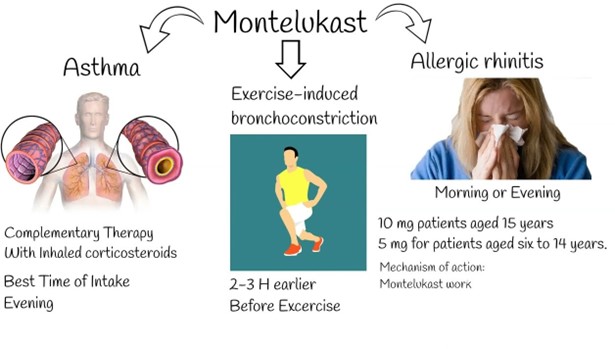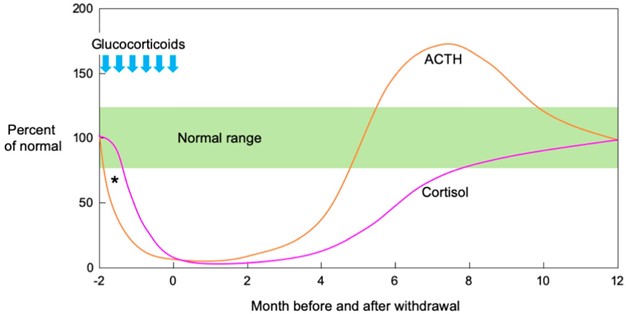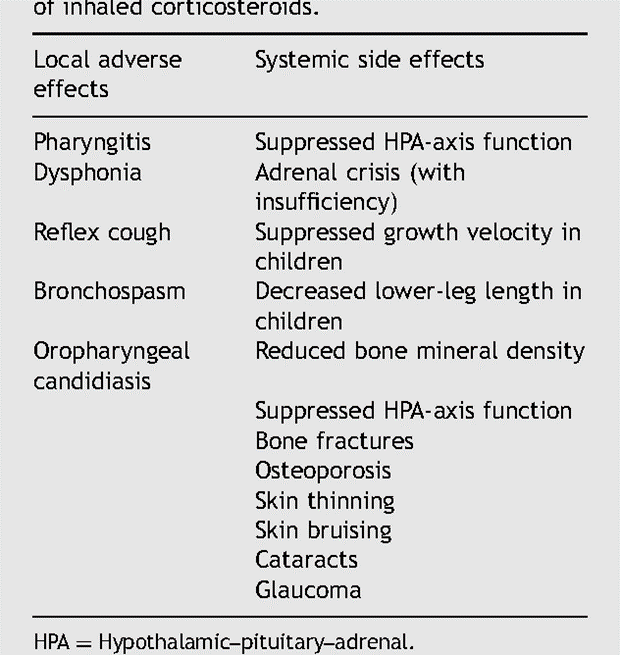A nurse is caring for a client who is taking montelukast. Which of the following outcomes indicates a therapeutic effect of the medication?
The client's seizure threshold is reduced.
The client experiences less muscle pain.
The client experiences an increased ease of breathing.
The client's platelet count is increased
The Correct Answer is C
Montelukast is a leukotriene receptor antagonist commonly used to manage asthma and allergic rhinitis. Its primary therapeutic effect is to improve respiratory symptoms by reducing inflammation and constriction of the airways. Therefore, an increased ease of breathing would be an expected outcome indicating that the medication is working effectively.
The other options are incorrect because:
A. The client's seizure threshold is reduced: Montelukast does not have any effect on the seizure threshold. This outcome is unrelated to the medication and may be indicative of a different condition or treatment.
B. The client experiences less muscle pain: Montelukast is not indicated for reducing muscle pain. This outcome is unrelated to the medication and may be indicative of a different condition or treatment.
D. The client's platelet count is increased: Montelukast does not have an effect on platelet count. This outcome is unrelated to the medication and may be indicative of a different condition or treatment.

Nursing Test Bank
Naxlex Comprehensive Predictor Exams
Related Questions
Correct Answer is C
Explanation
Prednisone is a corticosteroid medication commonly used to treat asthma and other inflammatory conditions. When taken for a prolonged period at higher doses, it can suppress the body's natural production of cortisol, a hormone produced by the adrenal glands. Abruptly stopping prednisone after long-term use can lead to adrenocortical insufficiency, also known as adrenal insufficiency or adrenal crisis.
Adrenocortical insufficiency occurs because the body's adrenal glands need time to resume normal cortisol production after being suppressed by prednisone. Gradually reducing the dose of prednisone allows the adrenal glands to gradually increase their cortisol production, minimizing the risk of adrenal insufficiency.
Rebound pulmonary congestion, hyperglycemia, and severe dehydration are not specific adverse effects associated with discontinuing prednisone. However, it is important for clients who have been taking prednisone to follow their healthcare provider's instructions regarding the tapering schedule and any potential risks or side effects.

Correct Answer is D
Explanation
Beclomethasone is an inhaled corticosteroid commonly used for the treatment of asthma. One of the potential side effects of inhaled corticosteroids is oral candidiasis, also known as thrush. Rinsing the mouth with water after each administration helps to reduce the risk of developing thrush by removing any residual medication from the mouth and throat.

The other options listed are not specific instructions for inhaled beclomethasone:
A. Check the pulse after medication administration: While it is important to monitor vital signs, such as pulse, in certain situations, checking the pulse after inhaled beclomethasone administration is not a specific instruction for this medication.
B. Limit caffeine intake: There is no specific need to limit caffeine intake when taking inhaled beclomethasone. However, it is generally advisable to discuss dietary considerations, including caffeine, with a healthcare provider, as individual factors and medication interactions can vary.
C. Take the medication with meals: Inhaled beclomethasone is usually taken as prescribed by the healthcare provider, and the timing of administration with meals is not typically specified.
However, it is important for the client to follow the specific instructions provided by their healthcare provider regarding the timing and frequency of inhaled medication administration.
Whether you are a student looking to ace your exams or a practicing nurse seeking to enhance your expertise , our nursing education contents will empower you with the confidence and competence to make a difference in the lives of patients and become a respected leader in the healthcare field.
Visit Naxlex, invest in your future and unlock endless possibilities with our unparalleled nursing education contents today
Report Wrong Answer on the Current Question
Do you disagree with the answer? If yes, what is your expected answer? Explain.
Kindly be descriptive with the issue you are facing.
